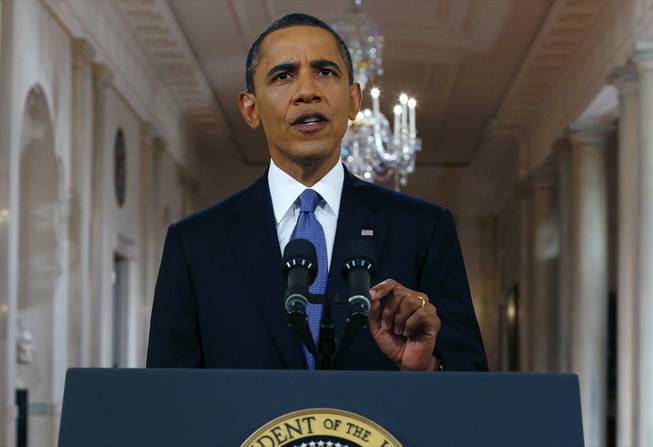
Pablo Martinez Monsivais / AP
President Barack Obama delivers a televised address from the East Room of the White House in Washington, Wednesday, June 22, 2011, on his plan to draw down U.S. troops in Afghanistan.
Wednesday, June 22, 2011 | 7:56 p.m.
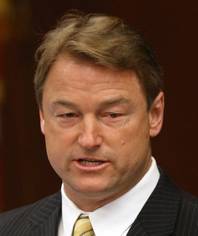
Dean Heller
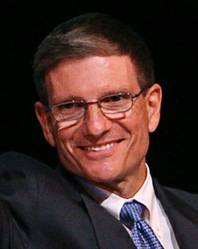
Joe Heck
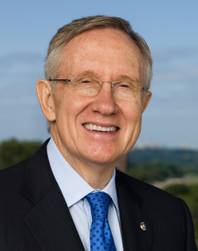
Harry Reid
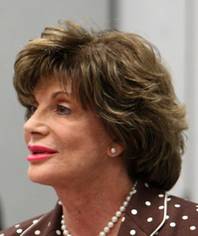
Shelley Berkley
Sun coverage
Republican leaders reacted to President Barack Obama’s speech announcing the return by this time next year of 33,000 troops from Afghanistan — about a third of the total fighting force — with pronounced trepidation.
• “I am concerned that the withdrawal plan...poses an unnecessary risk to the hard-won gains that our troops have made,” said Arizona Republican Sen. John McCain.
• “The drawdown...needs to be conducted in a manner that respects the professional judgment of our military commanders,” Senate GOP Leader Mitch McConnell echoed.
• “We all want our troops to come home...but we shouldn’t adhere to an arbitrary timetable,” GOP presidential front-runner Mitt Romney said.
But among Nevada’s national delegation, concerns about withdrawing too many forces too quickly were far more muted.
“Tonight’s announcement by the president is a positive first step, and I stand with him thanking our troops for their service,” Republican Sen. Dean Heller said in a statement released shortly after the conclusion of the speech.
“I have always said that removal of military personnel should be consistent with the advice of military leaders on the ground. By doing so, we can create increased stability in Afghanistan, continue to hand over more operations to Afghan security forces and, ultimately, bring our troops home,” Heller said.
Republican Rep. Joe Heck said, “Our brave men and women deserve tremendous credit for the job they are doing. As I’ve said all along, we must ensure that any drawdowns are based on conditions on the ground and the recommendation of our military commanders, not any specific timeline. We must be cautious about bringing the right troops home at the appropriate time so we don’t jeopardize the significant gains we’ve made. Bringing our troops home is the ultimate goal, and I believe that we are heading in that direction.”
For Obama, the announcement appears to have been as much a decision about setting strategic priorities at home as well as abroad.
Obama has been facing criticism from the right and the left, and even from those within his own administration, over his plans to accelerate a withdrawal of combat forces from Afghanistan starting next year and bring an end to combat operations by 2014.
There are some, mostly on the left, who are urging a faster cessation of operations than Obama outlined (though GOP presidential candidate Jon Huntsman also released a statement endorsing a faster drawdown).
There are others, mostly on the right, who are delivering a line we’ve heard often in the past: listen to the generals, who — led by current commander Gen. David Petraeus — having been urging the president to leave the troops in place at least until the end of 2012.
But Obama’s palette of objectives is bigger than just the theater of war in Afghanistan, and he captured that breadth of focus in his speech with one line that served as the fulcrum of the entire announcement: “America, it is time to focus on nation-building here at home.”
That’s certainly a line that would resonate with Nevadans. For the state that consistently ranks last in the nation in unemployment, foreclosures and education, prioritizing rebuilding on the home front isn’t just a slogan, it’s a necessity.
It’s not the first time Washingtonians have weighed foreign engagements against domestic objectives, either.
The defense budget — $1.3 trillion of which has been spent on the Afghanistan war since operations started a decade ago — is one of the mandatory defense spending areas lawmakers have discussed as a candidate for spending cuts.
Senate Majority Leader Harry Reid has even said lawmakers ought to more closely examine the potential for reductions there before Congress starts talking about reducing entitlement spending for programs such as Medicare and Social Security.
But Wednesday night, Nevada lawmakers steered clear of drawing the same connections as the president alluded to in his speech, reserving the focus of their reactions and comments solely for the status of operations in Afghanistan.
“The president’s plan to begin withdrawing troops from Afghanistan is a critical step in the right direction. I commend the many brave members of our Armed Forces who have served there and thank them for their sacrifice,” Reid said.
“As we withdraw our troops, the Afghans must continue to step up and take responsibility for their own country,” Reid said. “In the meantime, we must capitalize on the progress we’ve made in Afghanistan to finish the job and ensure al Qaeda’s long-term, strategic defeat. The president’s plan will allow us to do that.”
Democratic Rep. Shelley Berkley said, “Osama Bin Laden’s death marked a new chapter for America’s mission in Afghanistan and it’s time we begin bringing our troops back home. I support the president’s decision to begin this withdrawal and recognize that it must be done in a manner that keeps our forces safe, but I also hope that conditions on the ground will allow us to transfer additional military responsibility to the Afghan people at an accelerated pace. Such a move would enhance our ability to expedite the return home for even more of our brave men and women in uniform now serving in Afghanistan.”
Wherever lawmakers stand on the timeline, the president’s announcement marks the beginning of the end of combat operations in Afghanistan.
But for such a momentous occasion — Afghanistan has been the longest continuous U.S. combat operation since Vietnam — his words were noticeably measured as he spoke not about victories and conclusions but about continued processes and “achievable” goals.
“We won’t try to make Afghanistan a perfect place,” Obama said, reminding the country that the Taliban would have to participate in an Afghan government.
He had much stronger statements to make about two other countries that have gripped the United States’ attention in recent months: Pakistan, where Osama bin Laden was recently found and killed, and Libya, where lawmakers will vote this week whether to curtail the U.S.’s involvement under NATO by cutting funding for the mission.
“We’ll work with the Pakistani government to root out the cancer of violent extremism, and we will insist it keeps its commitments,” Obama said. But he added this warning to Pakistan: “So long as I am president, the United States will never tolerate a safe haven for those who seek to kill us.”
The president also indirectly chided those who have been criticizing his Libya policy, arguing that U.S. involvement there — through NATO, and only in an air capacity — is the way forward for the United States, which has to honor “our responsibility as an anchor of global security” while also being “as pragmatic as we are passionate.”
“When innocents are being slaughtered and global security endangered, we don’t have to choose between standing idly by and acting on our own,” Obama said. “Instead, we must rally international action as we’re doing in Libya.”
Heck, who has been leading the charge against Obama’s Libya policy in the House, which will vote on two bills to end funding for the operation this week, did not comment on Obama’s Libya references in his prepared statement.
It’s Heck’s Libya bill that’s expected to stand the best chance of passing the House, though likely not with the super-majority necessary to circumvent the president’s inevitable veto of the measure if it reaches his desk.

Join the Discussion:
Check this out for a full explanation of our conversion to the LiveFyre commenting system and instructions on how to sign up for an account.
Full comments policy